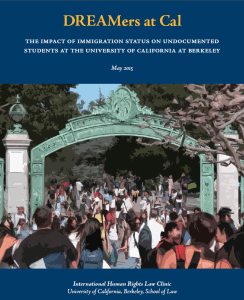
May 6, 2015 – Hunger, fear of deportation, and ineligibility for federal student loans are not the typical concerns of U.S. college students. But these complex issues shape the experience of undocumented students at UC Berkeley, according to a new International Human Rights Law Clinic (IHRLC) report. The study, “DREAMers at Cal: The Impact of Immigration Status on Undocumented Students at the University of California at Berkeley” provides data and recommendations to university, state, and federal officials seeking to support the success of undocumented students in higher education.
Based on surveys and interviews conducted with undocumented students on the UC Berkeley campus, the report explores how undocumented status impacts students’ path to higher education, university experience, and plans for the future. IHRLC conducted the study after establishing the nation’s first on-campus legal support program for undocumented students in 2012. IHRLC Clinical Instructor Allison Davenport directed the research project and oversees UC Berkeley’s legal program, which has served over 250 undocumented students. IHRLC alumni Habiba Simjee ’14 and
Genna Beier ’14 were critical members of the research team.
Who are the DREAMers?
Among the estimated 11.5 million undocumented immigrants living in the U.S. is a generation of young immigrants educated in the United States. Over a quarter of undocumented youth in the nation reside in California and it is estimated that over 2,000 undocumented undergraduate and graduate students are currently enrolled in the University of California system. These young undocumented immigrants, known as DREAMers, have become not only more visible on college campuses but in the national debate on immigration reform.
Navigating Higher Education
The report identifies barriers to higher education arising from undocumented status. Undocumented students are ineligible for federal financial aid despite their financial need. Nearly all students in the study (94%) reported annual family incomes of less than $50,000 with the vast majority of households (88%) living below 150% of the federal poverty level.
Despite recent efforts to provide more financial aid, the study’s findings reveal the precarious situation of undocumented students on campus. Nearly three-quarters of students (73%) reported skipping meals or reducing the size of their meals while studying at UC Berkeley. Almost a quarter (21%) of students reported a period of homelessness or lack of stable housing during the time they have been enrolled at the university. Among the report’s recommendations are to extend access to federal financial aid for undocumented students and expand the eligibility criteria and pool of resources available in California.
UC DREAMers and their Families
Nearly all students in the study came to the U.S. more than a decade ago when most were under the age of 12. Most students belong to mixed status families which means, according to Davenport that “Family members living under the same roof live very different lives due to immigration status. One sibling may enjoy full citizenship while another lives in constant fear of deportation.” Over half (57%) of the undocumented students surveyed indicated they have a sibling with lawful permanent status or U.S. citizenship, slightly more (59%) have an undocumented sibling, and several reported the deportation of a close relative.
A shift in the legal landscape came in 2012, when the Obama administration announced the Deferred Action for Childhood Arrivals (DACA) program, which provides temporary permission to live and work in the U.S. to certain eligible young immigrants. The overwhelming majority of research participants qualified for DACA. “DACA has provided stability and new opportunities to so many Cal students,” said Davenport, “But its future is uncertain and those students who do not qualify for the program continue to live without legal protection and permission to work.”
The report examines the central role of family for undocumented UC Berkeley students and how concern for family shapes their decisions. “DACA is a welcome change” noted Davenport, “but there is no peace of mind for these students until their parents and siblings have legal protection.”
Download a copy of the report “DREAMers at Cal” here.